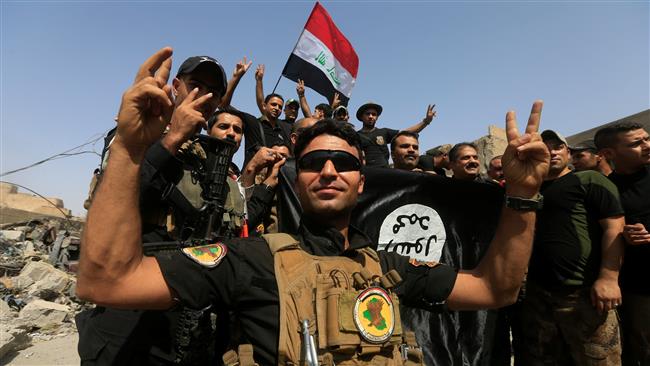Iran’s Defense Minister has hailed victory for Iraqi forces in the second city of Mosul as a victory over plots by the US and Israel.
Congratulating Iraqi groups on the liberation of Mosul from the Islamic State after an 8 1/2-month offensive, Hossein Dehqan proclaimed, “This major victory thwarted plots by the US and the Zionist regime.” He expressed hope that this would lead to the “complete defeat of the arrogant system’s strategy of waging proxy wars in the region”.
Iranian officials, headed by the Supreme Leader, have stepped up their rhetoric in recent weeks that the Islamic State is Washington’s creation.
See also “This Liberation of Mosul Must Not Be Squandered”
Significantly, Dehqan sent two separate messages of congratulations: one to Hadi al-Ameri, the commander of the Iranian-back Shia militias Hashd al-Sha’abi, one to Iraqi Defense Minister Erfan Mahmoud al-Hayali.
While Dehghan congratulated the Iraqi government and armed forces, his emphasis was on the militias — known as Popular Mobilization Units — envisaged by Iran as a key player in Iraq after the defeat of the Islamic State. The Defense Minister said it was “impossible” to achieve victories in Iraq without the sincerity, bravery, and devotion of the Hashd al-Sha’abi.
The Secretary of Iran’s Supreme National Security Council, Ali Shamkhani, also congratulated Iraqi Prime Minister Haider al-Abadi and the country’s leading Shia cleric, Grand Ayatollah Ali al-Sistani.
Shamkhani attributed victory in Mosul to the leadership of Shia clerics, the prudence of the Iraqi government, and bravery of the country’s army and popular forces.
While less direct than Dehqan, Shamkhani also used the messages to identify the US, Israel, and Saudi Arabia as the ongoing enemies. He said “the roots of terror-nurturing ideology” remained, with “the sentiments of the youth” abused by the intelligence services of “extra-regional countries” and the rulers of some regional states.
Echoing the Supreme Leader’s emphasis on a “soft war” facing Iran, Shamkhani said it is necessary to pay attention to the “cultural and intellectual confrontation with terrorism more than security and military confrontation”.

